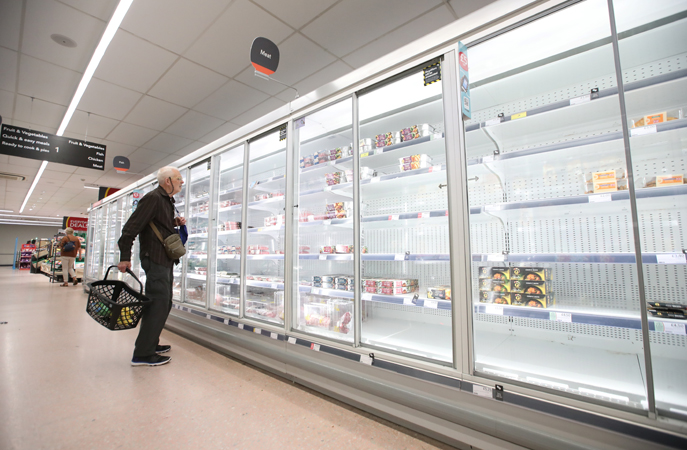In his monthly column, Oliver Balch reports on new initiatives to reveal data on the carbon footprint of products, how food brands are embracing systems change, and the impetus for greater transparency in supply chains
If there is one word that frames how and why the cogs of consumer capitalism keep turning, it is “choice”. So why, when it comes to sustainable purchasing, does choice go out of the window? Enter a supermarket or department store today, and the average conscious consumer is swamped with an array of eco-labels and sustainability stamps, all (to the shopper’s eyes) representing much the same thing. Look closer, and the on-pack details are typically scant or vague. All this when Covid has led consumers to value such information more than ever, according to PwC’s recent consumer insights pulse survey.
So it was good news to hear this week that Google has begun to roll out new product features in its search function to give people greener options when they travel and shop. This includes a new routing system on Google Maps that also displays the route that’s the most fuel-efficient, even if it isn’t the fastest. From this week, U.S. Google users will be able to see associated carbon emissions per seat for every flight, and quickly find lower-carbon options. And searches for hotels will yield information on sustainability efforts, from waste reduction and water conservation measures to whether they’re Green Key or EarthCheck-certified. The changes will be rolled out in Europe from next year.
This came following news that a clutch of UK food and drink retailers and brands are trialling a new front-of-pack climate rating scheme. The initiative, which counts M&S, Costa Coffee, Meatless Farm, Greencore, Abel & Cole, Mash Direct and Finnebrogue Artisan among its participants, ran throughout September. The month-long UK pilot was designed to test out a new traffic light scoring system that applies a red (bad), amber (medium) or green (okay) colour to denote the environmental footprint of individual products.

For further specificity, the labels also include an A* to G rating, much like energy efficiency ratings on white goods. Almost half (49%) of the score is attributed to performance on climate, with the remainder evenly balanced between water usage, water pollution and biodiversity loss. If shown to be successful, the scheme’s creator, the environmental non-profit Foundation Earth, plans to roll it out across Europe next year with the support of the European Commission’s sector accelerator programme, EIT Food.
One common mistake that the scheme appears to have avoided is the temptation to go it alone. Lone-wolf labelling initiatives spawn the Babelesque confusion now foisted upon shoppers. One possible exception could apply to retail brands that enjoy a sizeable slice of the market.
The U.S. retail giant Walmart, for instance, recently introduced its own in-store signposting system, which aggregates products with existing certifications into two themed buckets: one aimed at personal health (labels such as Great for You and EWG Verified) and another at the environment (including Rainforest Alliance Certified and the Better Cotton Initiative). The approach should give Walmart shoppers a basic steer, but it does little to distinguish “good” from “better”, for instance, or “better” from “best”.
Another upside of brand cooperation is data-sharing. Brands in identical categories, unsurprisingly, typically rely on similar raw ingredients. Often these are sourced from similar geographies by producers who use near-identical techniques. Ergo, the environmental impacts are going to have much in common. That is even truer for ubiquitous ingredients, such as soya, palm oil, crude oil, sugar and cotton, which crop up throughout brand portfolios. Without industry cooperation, however, manufacturers are left doing the sums themselves, for each ingredient, in every product. Not only does the cost of environmental footprinting become prohibitive, but the lack of comparability in the final results reduces the value of such efforts.
Consumer industries looking to tackle this data challenge should look to the cosmetics sector, which recently unveiled a consortium of major brands that plan to jointly develop a product-based scoring system. The group, which is being led by Unilever, Henkel, L’Oréal, LVMH, and Natura, intends to employ a common database and uniform methodology to ensure consistency in their individual assessments of product impacts.

Making their job (and that of others following in their footsteps) easier are moves to democratise existing data-gathering processes, which, at present, tend to be controlled by fee-charging information specialists. Taking the lead in opening up the industry is the Berlin-based startup Climatiq, which recently raised $2m to advance its plans for an open-source, free-to-use portal containing thousands of vetted carbon data points.
According to the carbon accounting specialist, tracking a company’s carbon footprint should be “as easy as installing Google Analytics” and “as simple to understand as a Wikipedia entry”. Given the choice, many consumers (and brands) would agree.
A systems approach to change
The global food system is under strain. With the global population edging up to the 8 billion mark, there are more mouths to feed than ever. Meanwhile, efforts by farmers to meet demand is seeing massive land use change, which, in turn, is exacerbating the biodiversity and climate crises. Something, clearly, needs to be done.
Hence, the UN Secretary-General’s decision to host a high-profile Food Systems Summit. Held to coincide with the recent UN General Assembly in New York, the event saw the usual slew of commitments and speeches. As important as what was said was who was in the room. Stakeholders from right across the food industry – indigenous farmers, smallholders, huge agribusinesses, food brands, scientists, financiers, consumer groups, legislators, regulators – put in an appearance. No huge accord or new global initiative was launched, but delegates came away with an agreed set of five action areas; namely, access to nutrition, sustainable consumption, nature-positive production, livelihoods and equality, and resilience.
Most importantly of all, the summit established once and for all that brand-led initiatives, welcome as they are, have to be designed and implemented in cooperation with others and with reference to the wider context. The cross-sector Food and Land Use Coalition captures the new direction of travel clearly, noting that the food sector now has a “truly systems-based approach to the global transformation that is required”.
Systems thinking is not easy. For brands operating in competitive environments, working closely with others goes against their cultural grain. In the case of their competitors, it may even run up against anti-trust rules. But try they must. One tactic that many are adopting is to identify levers within their respective industries that, if pulled, can kickstart or accelerate systemic change.

Brands’ influence on consumer behaviour is a case in point, something that the World Federation of Advertisers is aiming to harness through its Planet Pledge (signed by Carlsberg, IKEA, and PepsiCo, among other big brands). As the decision-makers and public face of brands, employees can also represent system change-makers. That’s certainly the thinking behind the recent decision by professional services firm Deloitte to educate all its 330,000 employees on the risks and opportunities associated with climate change. Trickier to negotiate, but no less influential, are brand relationships with fellow businesses, something Salesforce is looking to exploit with a new customer-focused tool aimed at helping its clients achieve net zero.
Equally important is for key systems players to come to a collective agreement about what their transformation journey looks like. Taking a leaf from the food sector’s book, for example, the steel, shipping, and aviation sectors have recently drawn up shared action plans on how they plan to achieve net zero by 2050. The roadmaps, developed under the umbrella of the World Economic Forum-inspired Mission Possible Partnership, echo similar sector-based “pathways” put forward (separately) by the UN’s High-Level Champions for Climate Action and by the World Business Council for Sustainable Development. (See Interview: ‘We just can't ask the other 70% of the economy to pick up the slack for hard-to-abate industries’)
Even systems, of course, don’t operate in isolation. Take food again. To get stock on the shelves involves a multiplicity of systems interacting and overlapping, from land use and energy to transport and urban planning. If space allows, perhaps the UN might consider an All Systems Summit next time round?
Transparency: Speak now or forever forgo your peace
Progress reports sound dull. Many times, they are. But, like it or not, they are becoming an increasingly central part of the sustainability landscape for global brands.
For years, brands with something to hide, or simply with better things to do with their resources, kept schtum. Coalitions would be joined and pledges made, and then … nothing, not a word. The days of such silence are fast disappearing. As the name suggests, transparent communication lies at the heart of the Extractive Industries Transparency Initiative (EITI), a leading anti-corruption scheme for hydrocarbon and mining companies. Reluctance on the part of oil giants Chevron and Exxon to reveal payments made to governments not affiliated to EITI (as per the initiative’s rules) saw both companies jettisoned from the group.

A more common repercussion of keeping quiet on progress is facing a naming-and-shaming saga. Look no further than the World Benchmarking Alliance’s (WBA) recent extensive analysis of the food and agriculture industry. On a scale of zero to 100, almost one third (31%) of the 351 large companies analysed score in single figures (U.S. restaurant chain Subway and German yoghurt brand Müller feature among the laggards). The message from WBA’s Richard Hardyment? “Get real, guys, and disclose some basic facts about your business impacts.” (See Big food companies ‘failing dismally’ on both climate and human rights)
Better all round to get on the front foot. That way brands stand a better chance of controlling the narrative, even (or, especially) when progress is slow. That’s the tactic taken by the Consumer Goods Forum’s Forest Positive initiative, which recently issued its first collective report. The document sees participating brands – which include the likes of Danone, Mars, Nestlé, P&G and Unilever – disclose side-by-side their performance against deforestation targets in four key commodity areas; namely, palm oil, soya, beef, and pulp/paper.
To its credit, the Consumer Goods Forum doesn’t look to sweeten the pill. “The speed of change hasn’t come quickly enough,” admits CGF’s managing director Wai-Chan Chan right up front. Embedded links to qualitative and quantitative data for 20 participating brands (plus acknowledgements for where data is “not yet available”) point to just where the shortfalls lie. The good, the bad, and the ugly, in other words – and all the better read for it.
This article is part of the October 2021 issue of Sustainable Business Review. See also:
Policy Watch: Kerry tells world leaders to ‘stop the BS’ and lift ambition at Glasgow
ESG Watch: Airlines and chemicals sector feel weight of collective investor pressure
Chad Holliday: ‘Hard-to-abate’ industries have to pull their own weight on tackling climate change
Big food companies ‘failing dismally’ on both climate and human rights
Google Maps Foundation Earth Climate Rating Scheme EIT Food Walmart United Nations Food Systems Summit Planet Pledge High-Level Champions for Climate Action WBCSD Extractive Industries Transparency Initiative WBA


